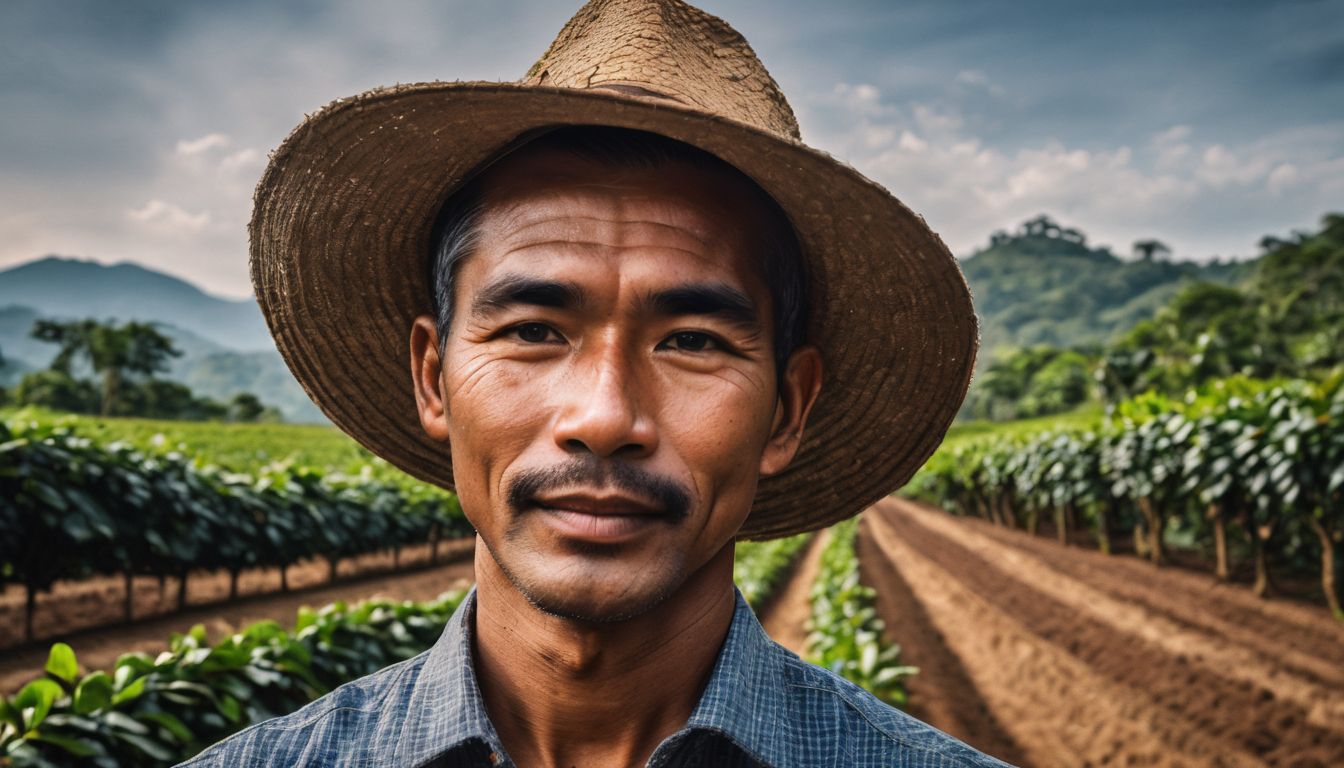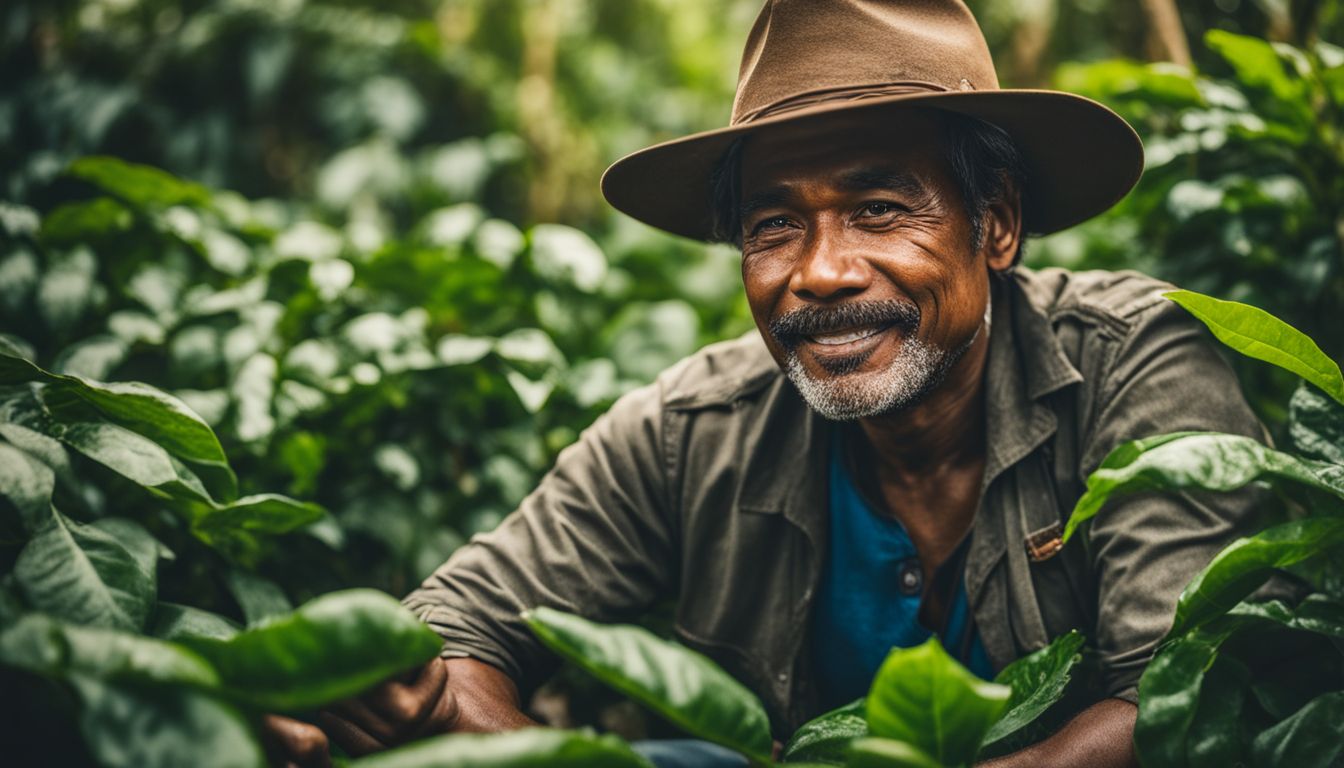Estimated reading time: 12 minutes

Introduction
Greetings, fellow coffee enthusiasts, and curious minds! Buckle up, because we’re about to dive into the wild world of Fair Trade and Ethical Sourcing in the Coffee Industry. This is where the beans are ethical, and the aroma of justice fills the air. Picture this: you, sipping your morning coffee, blissfully unaware of its journey from bean to cup, much like a protagonist in a coffee-themed epic. But fear not, for I, too, once guzzled my coffee without a care. Treating it like a mere morning ritual rather than the epic saga it is.
Then, like a coffee superhero receiving a caffeine-infused revelation, I stumbled upon the magical world of fair trade. Turns out, coffee could be more than just a wake-up call; it could be a force for good! Now, armed with the power of knowledge and fueled by an undeniable curiosity, I’m here to unravel the mysteries of ethical coffee sourcing.
So, my dear coffee comrades, get ready for an adventure. An expedition into the ethical unknown, where your favorite brew becomes a beacon of fairness, and your coffee mug becomes a vessel of change. Ready to embark on this enlightening journey with your trusty mug of java by your side? Let’s caffeinate our minds and set sail into the world of ethical coffee wonders!
Key Takeaways
- Fair trade and ethical sourcing practices in the coffee industry empower coffee-growing communities. This happens by ensuring fair compensation for farmers, leading to improved living conditions and opportunities for economic growth.
- By choosing fair trade coffee, we strengthen global connections. By doing this we also foster understanding and unity among diverse cultures while enjoying a delicious cup of joe.
- Ethical sourcing promotes responsible environmental practices in the coffee industry. This protects ecosystems, preserving biodiversity, and contributing to a better future for our planet.
Fair Trade And Ethical Sourcing In The Coffee Industry

The Importance of Fair Trade and Ethical Sourcing
Fair Trade and ethical sourcing in the coffee industry are essential for empowering communities, strengthening global connections, and fostering collaborative partnerships for positive change.
Empowering communities and transforming lives
Fair trade and ethical sourcing practices breathe life into coffee-growing communities. They create an avenue for farmers to receive deserving compensation for their efforts, thus altering the dynamics of their lives significantly.
Fair wages give them the power to lead healthier lives by investing in quality healthcare and better education for their children. As a result, these farming families gradually rise from poverty, making sustainable living possible through trade instead of aid.
Also, community development projects funded by premiums from the ‘Fair For Life’ label further enrich these villages with improved infrastructure facilities, adding another layer to this transformative journey.
It’s not just about buying coffee; it’s about aiding growth and fostering change where it counts.
Strengthening global connections
Fair trade practices work as a powerful tool to bridge the gap between nations. They help forge strong relationships worldwide, by creating direct and beneficial ties between coffee growers in developing countries and consumers around the globe.
By choosing Fair Trade coffee, you’re not only enjoying a delicious cup of joe but also contributing to an initiative that strengthens global connections.
Through ethical sourcing, we strengthen bonds with farming communities on other continents. These international relationships foster understanding, respect, and unity among diverse cultures and societies.
The act of ethically purchasing your morning brew becomes part of a bigger picture. It’s about being globally conscious and realizing that our choices have far-reaching impacts. Indeed, each cup represents much more than just coffee; it signifies flourishing global connections made through fair trade practices.
Collaborative partnerships for change
Collaborative partnerships are reshaping the way we source our coffee. Key players in the coffee industry, including producers, traders, retailers, and consumers like you and me, band together to prioritize fair trade and ethical sourcing.
These alliances serve a noteworthy purpose. To improve livelihoods of hardworking coffee farmers by ensuring they receive fair wages for their labor under humane working conditions.
A partnership approach also underscores a commitment towards environmental sustainability. This is done through efforts such as organic farming and biodiversity conservation. This can transform the entire ecosystem surrounding coffee production.
More than just business agreements, these collaborative partnerships strive to educate us all on why each cup of ethically sourced brew matters, not just for our taste buds. But also for supporting hardworking farmers and fostering sustainable development within coffee-growing regions worldwide.
What is Fair Trade?

Fair Trade ensures fair wages and safe working conditions for farmers, while also striving to eliminate child labor.
Prioritizing fair wages and safe working conditions for farmers
Ensuring fair wages and safe working conditions for coffee farmers is crucial in the pursuit of ethical sourcing. When farmers receive a fair price for their harvest, they can improve their livelihoods and provide better healthcare and education for their families.
By prioritizing safe working conditions, we protect the well-being of these hardworking individuals who contribute to our daily cup of coffee. Through fair trade certification and other initiatives, we can support farmers in building sustainable futures while enjoying our favorite brew guilt-free.
Eliminating child labor
For me, one of the most important aspects of fair trade and ethical sourcing in the coffee industry is the commitment to eliminating child labor. It’s crucial that we support producers who prioritize the well-being and rights of children.
Fair trade practices strictly prohibit forced child labor, ensuring that coffee is produced without exploiting young workers. This certification guarantees that our coffee consumption doesn’t contribute to this issue.
By choosing ethically sourced coffee, we can make a positive impact on the lives of children in coffee-growing regions and create better opportunities for their future.
Our conscious choices as consumers play a significant role in combating child labor associated with the coffee industry. It’s inspiring to know that through fair trade and ethical sourcing initiatives, we are actively working towards eradicating this practice.
Understanding Ethical Sourcing
Ethical sourcing involves ensuring fair compensation for farmers and laborers, as well as practicing responsible environmental practices.
Fair compensation for farmers and laborers
I believe that fair compensation for farmers and laborers is essential in the coffee industry. It means providing fair prices for coffee beans, ensuring fair wages, safe working conditions, and access to social and environmental programs.
By prioritizing fair compensation, we can reduce poverty and inequality in coffee-growing regions while offering farmers a sustainable income. This not only improves their livelihoods but also provides opportunities for economic growth in their communities.
Supporting brands that prioritize fair compensation allows us as consumers to contribute to making a positive impact on the lives of coffee farmers and laborers.
Responsible environmental practices
Choosing ethically sourced coffee is not only beneficial for the farmers but also for the environment. By supporting brands that prioritize fair trade and ethical sourcing, you are promoting sustainable and responsible environmental practices in the coffee industry.
Fair trade certification ensures that coffee farming methods protect valuable ecosystems and promote environmental stewardship. Furthermore, by considering the origin of coffee beans and supporting local farmers in coffee-growing regions, you are contributing to sustainable practices that help protect our planet.
So next time you enjoy a cup of coffee, remember to choose ethically sourced options to make a positive impact on both people’s lives and the environment.
The Benefits of Ethical and Sustainable Coffee Sourcing
Ethical and sustainable coffee sourcing not only protects the environment, but also improves the lives of farmers and boosts governments and economies.
Protecting the environment
Protecting the environment is crucial when it comes to fair trade and ethical sourcing in the coffee industry. By prioritizing environmental management programs, such as water conservation and proper waste disposal, fair trade certification encourages sustainable practices.
Additionally, ethical sourcing supports the preservation of biodiversity in coffee-growing regions. Investing in high-quality equipment and using reusable filters or pods also promotes environmental sustainability within the coffee-making process.
These efforts not only ensure a better future for our planet but also contribute to the production of high-quality, ethically sourced coffee that we can enjoy guilt-free.
Improving the lives of farmers
Fair trade and ethical sourcing in the coffee industry play a crucial role in improving the lives of farmers. When coffee farmers are paid a fair price for their harvest, they can invest in their families’ healthcare and education.
This empowers them to lift themselves out of poverty through trade, not aid. By supporting fair trade certification, we directly contribute to creating better living conditions for farming families in the developing world.
Boosting governments and economies
Ethical and sustainable coffee sourcing has a significant impact on governments and economies. When we support fair trade practices in the coffee industry, we are directly contributing to economic growth and development.
By prioritizing fair wages for farmers and ensuring safe working conditions, these practices empower local communities to thrive. Additionally, investing in quality espresso machines or coffee makers stimulates economic activity within the industry, creating more job opportunities.
This not only improves the lives of coffee farmers but also strengthens global connections by promoting trade partnerships that are built on fairness and collaboration. Supporting ethical sourcing is not just about enjoying great-tasting coffee; it’s about making a positive difference in the world.
The Disadvantages of Inadequately Sourced Coffee
Inadequately sourced coffee can lead to the exploitation of farmers and laborers, as well as environmental degradation. Discover how ethical sourcing can make a difference in the coffee industry.
Exploitation of farmers and laborers
Farmers and laborers associated with inadequately sourced coffee face significant exploitation. They often receive low wages, endure poor working conditions, and lack access to essential healthcare and education opportunities.
This exploitation perpetuates cycles of poverty and inequality within coffee-growing communities. Furthermore, inadequate sourcing practices contribute to environmental degradation, including deforestation and the loss of vital habitats for plant and animal species.
It is crucial for us as consumers to support fair trade and ethical sourcing initiatives. This is done in order to protect the well-being of these farmers and laborers while preserving our planet’s precious resources.
Environmental degradation
Inadequate coffee sourcing practices can have a devastating impact on the environment. The clearing of forests for coffee plantations contributes to deforestation, resulting in the loss of habitat for many species.
Not only that, but the use of pesticides and chemical fertilizers in coffee production can contaminate soil and water sources, leading to pollution and damage. Soil erosion and degradation are also concerns, as they reduce land fertility and sustainability in the long run.
Additionally, improper disposal of coffee waste like pulp and husks can pollute nearby water bodies and harm aquatic ecosystems. It’s crucial for us as consumers to support ethical and sustainable coffee sourcing to minimize these environmental risks.
Solutions for Ethical and Sustainable Coffee Sourcing
To ensure ethical and sustainable coffee sourcing, options such as fair trade and direct trade are available, along with consumer awareness and support. Find out more about these solutions to make a positive impact on the coffee industry!
Fair trade and direct trade options
I support fair trade and direct trade options in the coffee industry. These options ensure that farmers receive a fair price for their hard work and dedication. Fair trade certification promotes community development and environmental stewardship, and it directly supports improvements in the lives of farming families in developing countries. By purchasing products with fair trade certification, I am making a positive impact on people’s lives.
Consumer awareness and support
As coffee lovers and potential buyers, we have the power to make a difference in promoting ethical and sustainable coffee sourcing. By being aware of our choices and supporting brands that prioritize fair trade practices, we can help improve the lives of local farmers in coffee-growing regions.
When we choose to purchase from brands with certifications like Rainforest Alliance or USDA Organic, we are showing our commitment to ethical and sustainable sourcing practices. Let’s make small changes in our coffee consumption habits. Like using reusable cups or supporting brands with sustainable practices. This way we can together contribute to a more sustainable future.
Conclusion
In a world full of coffee jargon, fair trade and ethical sourcing aren’t just fancy buzzwords. They’re like the superhero duo fighting for justice in the coffee universe. These also aren’t just coffee labels. They’re the cape-wearing champions of farmers, the defenders of the environment, and the architects of global friendships.
So, next time you’re sipping on that ethically sourced cup of java, know that you’re not just savoring a beverage; you’re joining a league of coffee superheroes! It’s like your coffee mug is the bat signal for positive change.
Choosing fair trade coffee isn’t just a choice; it’s a tiny rebellion against bland and unfair coffee practices. It’s like being the Robin Hood of the coffee world – taking a sip for yourself while giving back to the hardworking souls who bring you that liquid gold.
Let’s clink our mugs together, not just for a caffeine-induced high, but for a better, fairer future where our coffee not only wakes us up but also wakes up positive change worldwide. Here’s to guilt-free sipping and a world where our coffee choices make a real impact!
FAQs
1. What does fair trade mean in the coffee industry?
Fair trade in the coffee industry means that farmers receive a fair price for their products, ensuring better working conditions and sustainable farming practices.
2. How can I support fair trade and ethical sourcing in the coffee industry?
You can support ethical sourcing in the coffee industry by purchasing coffee that is certified as ethically sourced or produced through fair trade initiatives.
3. Why is fair trade and ethical sourcing important in the coffee industry?
Fair trade and ethical sourcing is important in the coffee industry because it helps to alleviate poverty, empower farmers, protect workers’ rights, and promote environmentally friendly practices.
4. Are there any benefits to consumers when buying fair trade coffee?
Yes, when you buy fair trade coffee, you are supporting a more equitable supply chain and ensuring that farmers receive a fair price for their labor. Fair trade also promotes environmentally sustainable practices and high-quality products.
5. Can I find fair trade or ethical sourcing of coffees easily?
Yes, many brands now offer Fair Trade Certified or ethically sourced coffees, which can be found at specialty stores or online retailers. Look for labels and certifications to ensure your purchase aligns with your values.
